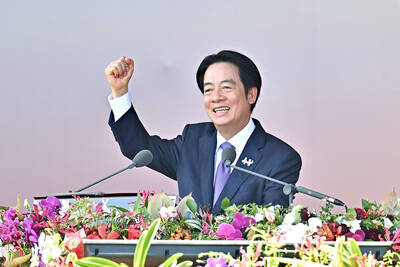The Cabinet has sanctioned a list of public holidays to be observed by government agencies next year, showing a total of 115 days off, with six extended holidays that last three or more days, including the Lunar New Year holiday, which lasts nine days, the Directorate-General of Personnel Administration (DGPA) said yesterday.
There will be only one make-up day next year, on Feb. 8.
Other extended holidays include a four-day holiday from April 3 to 6 to mark Children’s Day/Tomb Sweeping Festival, and several others lasting three days, including the 228 Peace Memorial Day (Feb. 28 to March 2), Dragon Boat Festival (May 30 to June 1), Mid-Autumn Festival (Oct. 4 to 6) and National Day (Oct. 10 to 12), according to the 2025 calendar published by the agency.

Image courtesy of the Directorate-General of Personnel Administration
The day before Lunar New Year’s Eve which falls on Jan. 27, a Monday, is also designated a holiday and will be made up on a later Saturday on Feb. 8, the DGPA said in a news release.
However, there will be no make-up work days for the Children’s Day/Tomb Sweeping Festival long weekend, the DGPA said.
The list of holidays issued for government agencies and state-run entities does not include Labor Day on May 1, when workers get a day off under the Labor Standards Act ( 勞動基準法), or Armed Forces Day on Sept. 3 for military personnel.
When a public holiday falls on a Tuesday or Thursday, an additional “bridge day” to the weekend is usually granted, as the government makes arrangements to turn it into an extended holiday weekend, which includes designating another Saturday a make-up work day.

The Ministry of the Interior (MOI) is to tighten rules for candidates running for public office, requiring them to declare that they do not hold a Chinese household registration or passport, and that they possess no other foreign citizenship. The requirement was set out in a draft amendment to the Enforcement Rules of the Public Officials Election and Recall Act (公職人員選舉罷免法 ) released by the ministry on Thursday. Under the proposal, candidates would need to make the declaration when submitting their registration forms, which would be published in the official election bulletin. The move follows the removal of several elected officials who were

FOUR DESIGNATED AREAS: Notices were issued for live-fire exercises in waters south and northwest of Penghu, northeast of Keelung and west of Kaohsiung, they said The military is planning three major annual exercises across the army, navy and air force this month, with the navy’s “Hai Chiang” (海強, “Sea Strong”) drills running from today through Thursday, the Ministry of National Defense said yesterday. The Hai Chiang exercise, which is to take place in waters surrounding Taiwan, would feature P-3C Orion maritime patrol aircraft and S-70C anti-submarine helicopters, the ministry said, adding that the drills aim to bolster the nation’s offshore defensive capabilities. China has intensified military and psychological pressure against Taiwan, repeatedly sending warplanes and vessels into areas near the nation’s air defense identification zone and across

SENATE RECOMMENDATION: The National Defense Authorization Act encourages the US secretary of defense to invite Taiwan’s navy to participate in the exercises in Hawaii The US Senate on Thursday last week passed the National Defense Authorization Act (NDAA) for Fiscal Year 2026, which strongly encourages the US secretary of defense to invite Taiwan’s naval forces to participate in the Rim of the Pacific (RIMPAC) exercise, as well as allocating military aid of US$1 billion for Taiwan. The bill, which authorizes appropriations for the military activities of the US Department of Defense, military construction and other purposes, passed with 77 votes in support and 20 against. While the NDAA authorizes about US$925 billion of defense spending, the Central News Agency yesterday reported that an aide of US

NATIONAL DAY: The ‘Taiwan Dome’ would form the centerpiece of new efforts to bolster air defense and be modeled after Israel’s ‘Iron Dome,’ sources said President William Lai (賴清德) yesterday pledged to strengthen the nation’s air defense capabilities and build a “T-Dome” system to create a safety net against growing military threats from China. “We will accelerate our building of the T-Dome, establish a rigorous air defense system in Taiwan with multi-layered defense, high-level detection and effective interception, and weave a safety net for Taiwan to protect the lives and property of citizens,” he said in his National Day address. In his keynote address marking the Republic of China’s (ROC) 114th anniversary, Lai said the lessons of World War II have taught nations worldwide “to ensure that